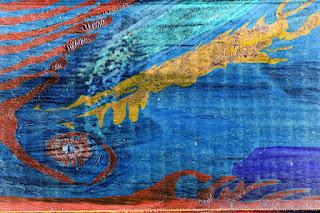You might have seen a TV commercial featuring a family dinner. One man is wearing an Oakland Raiders jersey while his wife’s entire family is proudly wearing Kansas City Chiefs clothes. It's an effective TV commercial. We have all experienced tense table time and we can identify with being the ‘newly-invited one’. Deep rivalries and earnest fandom make sense to the viewing audience. Throw in the idea of a strong American streak of independence and the admiration we have for people who swim against the current and you have an effective and memorable TV spot.
Why shouldn't a man be able to wear whatever he wants? Why should he have to mask his love and loyalties simply because he is at a family gathering? After all, it is a free country and people are entitled to walk and talk and think anyway they choose. Yes, we Americans all live in a free country and we do have rights.
However, anyone visiting the “in-laws” can understand the need for diplomacy and tact. Even taking into account the value that we place in having pride in one’s own identity, when we live within a family we all have to compromise. Sometimes we do better by being less obvious in our personal expression. We might realize that being provocative for the sake of being provocative does not contribute to a stable family experience.
This week’s Parshah, Vayeshev, introduces us to another famous garment and tense family setting. Jacob loves Joseph and gives him some type of ornamented or striped tunic. (The Hebrew mentions stripes and does not mention ‘colors’- that may be the result of Andrew Lloyd Webber and others’ interpretations). Within one verse the brothers begin to hate Joseph and within a few short paragraphs the brothers beat him, strip him naked, throw him into pit and then sell him into slavery. Is the garment incendiary enough that it would cause such a reaction? Think of the son-in-law in the TV spot. It’s plausible that his in-laws would beat him up and sell him as a slave. It is not the colors of the garment but the symbolism behind the garment that matters.
Jacob’s favoritism of Joseph was as deeply hurtful to the brothers as the insensitivity of the Raiders’ fan was to the in-laws. Favoritism rubs us all the wrong way. It violates our sense of fairness which is deeply rooted; almost as deeply rooted as loyalty and love.
If only Jacob had exercised the same type of tact that this Raiders’ fan could have shown. Then the family dinner would have potentially gone off without a hitch and Joseph might not have been sold into slavery. Of course, without Joseph as viceroy the entire family would have possibly perished from the drought in Canaan. That’s a different story and the voice of Torah might say “Steven, be careful with monkeying around with major elements such as these.” I would reply that I come from a long line of Rabbis whose legacy it is to prompt questioning. If we learn from the TV commercial or the Parshah to exercise greater thoughtfulness within our families , who knows- we might just eliminate future family crises.
How grand that would be!
Shabbat Shalom.









